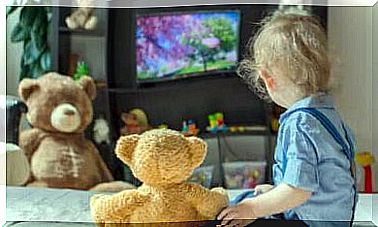Fury: How To Calm Them Down With A Question

Were you aware that it is possible to neutralize your child’s tantrums with just a single question? No, you do not have to be a magician. Simply apply a bit of psychology and then their tantrums will be easier to deal with.
This idea goes against what many people think and what many people do at home. There are many who believe that it is impossible to stop a tantrum.
Some specialists recommend respecting the moment the child explodes because they feel overwhelmed by their emotions. But recently, some experts have started talking about an effective method that can soothe tantrums.
This strategy is related to the child’s cognitive capacity. It depends on the willingness of the parents or teachers to teach the child to control their emotions effectively.
The factors that can bring children to the brink of a tantrum are virtually endless. Maybe your daughter has left her blanket of security at home. Or your son does not bother in bed. Maybe they want to keep playing in the bathtub, or else your toddler wants a piece of candy. It may even involve a broken toy.
Many times our kids are just tired. It would take an eternity if we were to name all the possibilities, and there is no reason to make such a list. We already know the things that can send our kids over the edge.
But what we need to focus on is reassuring our children. It is important to know that this does not require special therapy or a visit to a psychologist. We just need to help our children put things in a new perspective when it comes to the problem that has created a negative reaction.

What to do when they have a tantrum?
Our level of patience drops just as we think of the word tantrum . Unfortunately, parents who have children under the age of 5 get ineffective habits when faced with tantrums.
When we are confronted with a child who kicks and screams, we focus only on scolding, punishing and forbidding.
Let us not forget that we are dealing with a little person who does not know how to control his emotions. We can not ignore the huge responsibility we have to help them develop emotionally and intellectually.
Now there is probably someone asking what tantrums have to do with the child’s intellectual development. In order to answer that question, we will quote a definition given by the Royal Spanish Academy: Intellect is “understanding the cognitive, rational potential of the human soul.”
When we talk about the “human soul”, the definition is not specific about age. So if intellect is something we inherit, why not help our children analyze the situations that make them frustrated in a rational way?
Learning to control emotions is part of a child’s development. So it is in our hands to help them grow and achieve emotional stability that will allow them to mature according to their age.
The big question

We would like to invite you to ask your child a question the next time they have a tantrum. Ask your child about this: “Is it a small problem, a medium-sized problem or a big problem?”
Your child will most likely answer that it is a big problem. If so, do not answer that it is not really a big problem. If you do this, then you are underestimating your child’s frustration and minimizing the importance of their emotions.
The best thing you can do is accompany your child through the process of identifying the problem. If your child says it’s a big problem, then that’s how it is. At least that’s how it is from their perspective. So our job is to help him find a solution to the problem.
Once you have identified the root of the problem, you can let the child look for a solution. Teach your child that the fastest way to overcome conflicts is to find solutions.
Once you have gotten him out of his tantrum and he is in a more stable, emotional state, you can ask him if it was difficult to solve the big problem. When he tells you it was easy, close the conversation by highlighting the idea that if the solution was small, then the problem might not have been as bad as first assumed.
Involve yourself in the process. Accompany your child when he makes mistakes. Do not be like the majority of parents who only judge the tantrum. It helps nothing.
Children do not need condemnation. They only expect to be able to count on the help of the adults so that they can grow up with confidence in the happiest possible way. This is our amazing job.









